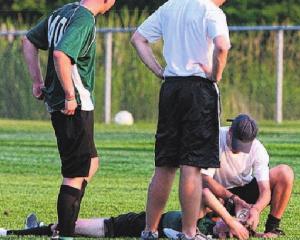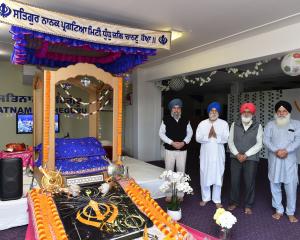Carlos Biggemann (25) prefers to look at life through his camera lens.
But the Dunedin man, originally from Bolivia, is spending the summer in Santa Cruz, Bolivia, encouraging people visiting his fourth photography exhibition, "Dramatic Skies", to look at life through his eyes.
Mr Biggemann has Down syndrome, which he says is not a disability but rather something that has encouraged him to look for the positive in everything.
"I am a human being. I have legs and arms and a brain to think and that is why I am happy.
"I don’t have disadvantages, I keep on living and looking."
Last June, he travelled to London to accept a trophy for winning the international section of the Down’s Syndrome Association’s My Perspective photography competition, but his passion for photography began 15 years earlier.
"I was always the camera man of the family."
A small Canon camera he received as a Christmas present was soon replaced by a digital single-lens reflex, snaps of friends and family followed, and his photographs began appearing in Bolivian newspapers and magazines.
In 2006, Mr Biggemann faced the "biggest challenge" of his life when he moved from Bolivia to Dunedin so his father could take on a role in the University of Otago’s marketing department.
Ten years on, Dunedin is very much home, he says.
After graduating from Bayfield High School, he completed a diploma in photography at Aoraki Polytechnic.
Since gaining the qualification he has held three photography exhibitions, two in Bolivia and "Dramatic Disguise" at the Dunedin Railway Station last year.
At present, Dunedin’s tie-dye morning skies and broody pre-storm clouds are on display on the other side of the world in his fourth exhibition "Dramatic Skies".
The exhibition took him two years to collate.
Before travelling to Bolivia for the exhibition, he said he was "very excited".
"I’m very content to put on this exhibition to show my family and friends that these are the skies that you can see from here in New Zealand."
While he appreciated "everything" in his life, there was still much more he wanted to achieve, both photographically and personally.
Waking up at dawn to wait while the perfect balance of red and yellow appeared in the sky was easy and enjoyable for him, but things other 25-year-olds might take for granted were often not.
As well as aspiring to learn Portuguese, which would be his fourth language, he is determined to live independently.
"Nowadays, some people who are my age, they waste their time playing Xbox or PlayStation, watching TV until your eyes hurt.
"They don’t appreciate their opportunities and that’s what I call disability," he said.
"People with what people think are disabilities also live full lives; they also are human.
"When I see people in wheelchairs, or having no feet or arms, I just put a smile on my face — you have this thing, but I don’t see you in a negative way or reject you. I watch you like a human being."
Armed with his camera and zest for life, he says he wants to turn his lens on wildlife.
"I can’t do wildlife photography in Bolivia though. In Bolivia you can only see a mosquito," he joked.
He hoped to turn the "Dramatic Skies" exhibition into the first of "lots of books" when he returned to New Zealand in February.



















